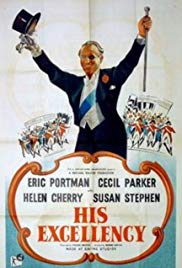His Excellency ** (1952, Eric Portman, Cecil Parker, Helen Cherry, Susan Stephen, Edward Chapman, Robin Bailey, Clive Morton, Geoffrey Keen) – Classic Movie Review 7752
The 1951 film comedy His Excellency is based on a London stage comedy by Dorothy Christie and Campbell Christie, in which a British socialist government sends dockers’ trade union supporter George Harrison (Eric Portman) to rule a British Mediterranean island colony. There the blunt Yorkshireman infuriates one and all with his undiplomatic ways, until his skills are required to quell a riot.
This awkward yarn becomes a surprisingly unexciting and unsuccessful film, a nasty little shock from Ealing Studios, writer-director Robert Hamer and star Portman. With its funny, smug ideas that seem to look down on people, His Excellency cannot ever have been much of a story, and, if it was, it is either poorly assembled as a film or has just wilted with the passing of time.
However the acting is distinguished enough. Portman is more than fine, though, in a tricky role and it is hard to take against Cecil Parker as Sir James Kirkman, Helen Cherry as his wife Lady Kirkman, Susan Stephen as Peggy Harrison and Edward Chapman as The Admiral. Sorry to find fault with Hamer, director of the classic Kind Hearts and Coronets, Pink String and Sealing Wax, It Always Rains on Sunday and Father Brown, who has to be judged by the highest standards – his own.
His Excellency is shot at Ealing Studios, Ealing, London, and on location in Sicily.
Also in the cast are Edward Chapman, Robin Bailey, Clive Morton, Geoffrey Keen, Alec Mango, John Salew, Eric Pohlmann, Howard Marion Crawford, Paul Demel, Elspeth March, Henry B Longhurst, Gerard Heinz, Barbara Leake, Barbara Cavan, Basil Dignam, Laurence Naismith and Victor Maddern.
His Excellency is directed by Robert Hamer, runs 84 minutes, is made by Ealing Studios and Michael Balcon Productions, is released by General Film Distributors, is written by Robert Hamer and W P Lipscomb, based on the play by Dorothy Christie and Campbell Christie, is shot in black and white by Douglas Slocombe, is produced by Michael Balcon and Michael Truman, and is scored by Ernest Irving. The score is based on themes by Handel, arranged, composed and directed by Ernest Irving, and played by the Philharmonia Orchestra.
Both Hamer and Portman (13 July 1901 – 7 December 1969) were gay. Newspapers did not reveal Portman’s sexuality in the Fifties and Sixties when homosexuality was illegal in the UK and it could have damaged his career. His partner was actor Knox Laing.
© Derek Winnert 2018 Classic Movie Review 7752
Check out more reviews on http://derekwinnert.com



